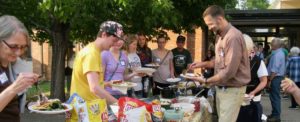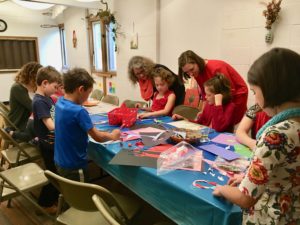Sermon for Sunday, September 9, 2018 – “Persistent Faith”
Sixteenth Sunday after Pentecost
September 9, 2018
Good Shepherd Lutheran Church
Decorah, Iowa
Rev. Amy Zalk Larson
Click here to read scripture passages for the day.
Beloved of God, grace to you and peace in the name of Jesus. Amen.
This is a really troubling story. It raises all sorts of questions. Why does Jesus, the very face of God’s compassion, refuse to heal this woman’s daughter? Why does he call her a dog, saying it isn’t fair to take what’s intended for the children of Israel and throw it to the dogs?
The children of Israel are indeed God’s chosen people, but shouldn’t Jesus help other people too? The Syro-phoenicians were ancient enemies of Israel, but doesn’t Jesus tell us to turn the other cheek? And why does to call her a dog? That seems a bit extreme.
The woman persists, saying, “Sir, even the dogs under the table eat the children’s crumbs.” Jesus responds, “For saying that, you may go – the demon has left your daughter.”
So, Jesus relents and heals her daughter because she has a good comeback?
Many interpreters feel this encounter helped Jesus to see that his mission was for all people – even Israel’s enemies. And maybe that’s what happened. We don’t know; we can’t really know for sure.
One thing we can see in this story is the power of persistent faith.
- The Syrophoenician woman seeks Jesus out even when he’s trying to escape notice.
- She kneels at his feet and pleads with him.
- She doesn’t give up but stays engaged – giving a strong, thoughtful, humble response back to Jesus.
- Jesus is moved by her response and heals her daughter.
This story reveals a God who’s influenced by our persistence. What this woman did and said made a difference to Jesus. Our persistence, our willingness to engage matters to God; we see that throughout scripture. Our willingness to ask questions and struggle with faith and prayer are important.
Yet that kind of persistence doesn’t come easily. When we’ve prayed, worked, questioned, hoped and pleaded, yet don’t see any change, it’s so easy to give up and think that God doesn’t really hear, that God doesn’t really care.
Thankfully, God doesn’t just sit around hoping we will be persistent. God is much more persistent than we will ever be.
God persists in loving, challenging, forgiving and healing us again and again. And God cannot be stopped from doing this. Even when we put Jesus to death on a cross, he rose again. Nothing, not even death, can prevent God from loving us all and working to heal us all.
God’s persistent, dogged, determined love for us gives us strength to persist in praying and working for healing and change.
I give thanks for the ways that persistence has brought important change in our church, the Evangelical Lutheran Church in America. Our church is stronger, more inclusive, and more able to witness to our welcoming God now that we ordain women and lesbian, gay, bisexual, transgender, queer and gender non-conforming people with gifts for public ministry. This change happened as the Holy Spirit worked through the faithful persistence of women, LGBTQ folks and their advocates.
And now, kids: Listen up, I’m going to talk about you. Today I especially give thanks for children who have persisted in asking to be fed at Christ’s table.
When I was first a pastor in Northern Minnesota, the children of the congregation received communion when they were in fifth grade, after a First Communion class. I loved teaching that class. I loved the way First Communion was an important milestone for the kids.
But then one Sunday, a new family was in worship with their four-year old son. I preached about how Jesus meets us in the bread and wine at the table. Apparently, the little boy was taking it all in. When it came time for communion, he came to the rail with his parents and held out his hands expectantly. I gave him a really special blessing and a big smile but no bread – he was too young. He burst into tears. He started crying, “I want Jesus”, really loudly, over and over. His parents had to pry him away from the rail and drag him away. He continued to repeat, “I want Jesus”, as they carried him down the very long aisle and out the back of the church.
Similar things happened again and again in that congregation and have happened throughout the ELCA. The cries of children longing to be fed at Christ’s table have caused our church to reconsider our policies and practices around communion.
Our current guidelines now say that yes, we want children to learn about communion and what it means for them, but we don’t have to wait to start teaching them and sharing the meal with them. Infants and very young children can be given communion and can receive age appropriate teaching about communion as they develop. That is our practice now at Good Shepherd.
Having children at the table, having children serve us communion as they will today is helpful for the whole church. It shows us that these gifts are sheer grace, they aren’t given to us because we understand rightly or believe rightly or live rightly. They are gifts of grace. We can never fully understand what God has done for us in Christ Jesus and how Jesus meets us at the table. But we are welcomed into a community in which we grow and learn and receive together.
God persists in working through the church to provide a space of welcome, a space where encounters of healing and change and grace can happen.
We are welcomed here even when we struggle to believe, even we despair, even when we feel anything but persistent.
We are welcomed and healed around the table of God’s love and mercy. And then, we are sent out from the table to let others know that they too have a place of welcome in God’s heart. We are sent to make bigger tables where all people can be fed and healed. We can persist in this work because our persistent God is always at work at the healing of the world.
Thanks be to God.
This Week at Good Shepherd, September 10-16, 2018
 Tuesday, September 11
Tuesday, September 11
9:30 a.m. Anna Circle – All contribute as hosts at Aase Haugen
3:45 p.m. – Education Committee
4:45 p.m. – Facilities Improvement Committee
Wednesday, September 12
10:30 a.m. – Communion at Aase Haugen
2:00 p.m. – Miriam/Ruth Circle – Carrie Solberg hosts
5:30 p.m. – Confirmation Class
7:00 p.m. – Choir Practice
8:00 p.m. – Band Practice
Thursday, September 13
10:00 a.m.- Bible Study with Pastor in the Narthex
5:00 p.m. – Executive Committee
Friday, September 14
4:00 p.m. – Evangelism Committee
Sunday, September 16 – Seventeenth Sunday after Pentecost
8:45 a.m. – Choir warmup
9:30 a.m. – Worship with Holy Communion- broadcast 11:00 a.m.
10:30 a.m. – Fellowship Hour
10:50 a.m. – Sunday School and Youth Forum
11:00 a.m. – Adult Forum – Berlin: Before and After the Wall Fell – Narthex
5:00 p.m. – Welcome Friends and Neighbors Picnic
Memorial Service for Amme Anderson, Saturday, October 13, 2018
 Alma (Amme) E. Anderson (aged 89) died on September 1, 2018 at Fairhaven Skilled Nursing Care (Whitewater, WI).
Alma (Amme) E. Anderson (aged 89) died on September 1, 2018 at Fairhaven Skilled Nursing Care (Whitewater, WI).
A Memorial Service celebrating her life will be held at 1:00 p.m. Saturday, October 13, 2018 at Good Shepherd Lutheran Church in Decorah with Pastor Amy Larson officiating.
Visitation will begin at 11:30 a.m. Saturday, one and a half hours before the service, at Good Shepherd Lutheran Church.
Inurnment will be in Phelps Cemetery in Decorah. A link to the obituary may be found here. Obituary for Amme Anderson
Sunday, September 9 – Special Events
 RALLY SUNDAY is Sunday, September 9 – The kids will lead us in worship, communion, and offer special music with the band and choir. Sunday School Forum will kick off at 10:50am.
RALLY SUNDAY is Sunday, September 9 – The kids will lead us in worship, communion, and offer special music with the band and choir. Sunday School Forum will kick off at 10:50am.
 FACILITIES IMPROVEMENT COMMITTEE will share its proposal for building improvements during Fellowship Hour on Sunday, September 9. Join chair Lindsay Erdman and the committee to learn about the proposal and ask your initial questions.
FACILITIES IMPROVEMENT COMMITTEE will share its proposal for building improvements during Fellowship Hour on Sunday, September 9. Join chair Lindsay Erdman and the committee to learn about the proposal and ask your initial questions.
ORDINATION CELEBRATION – On Sunday, September 9, we will celebrate the 55th anniversary of the ordination of Good Shepherd member Rev. Brad Hanson, Professor Emeritus of Religion at Luther College. Thanks to be God for Brad’s faithful ministry of teaching and service.



